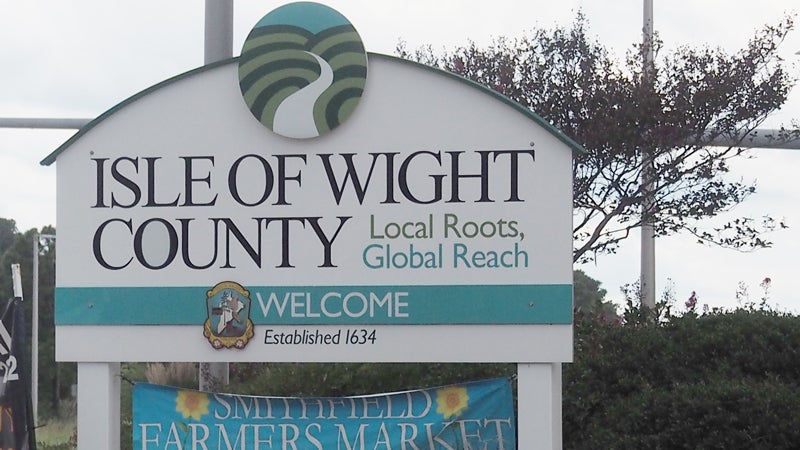Bears are liking Surry
Published 10:34 am Wednesday, July 12, 2017
Black bear population is growing
By Ryan Kushner
Staff writer
SURRY—More black bears are hanging around Surry County.
The county’s bear population has increased by 6 percent in the past year, according to Emergency Services Coordinator Ray Phelps, and the number of resident sightings has jumped accordingly.
One was reportedly spotted in the town of Surry this past week, moseying around the 7Eleven, according to Phelps.
“That’s pretty close in a populated area,” said Phelps. “You wouldn’t expect to see that, but you know it’s possible.”
Phelps said the best thing residents can do is make sure they are disposing of their garbage correctly and not leaving any scraps of food out.
Should you happen to see one, “the best thing to do is stay clear,” Phelps said. {mprestriction ids=”1,2,3,4,5,6″}
The majority of reported sightings have been largely concentrated in the area around Runnymede Road in Elberton, as well as along White Marsh Road, according to Phelps.
Two bears sighted in the county have been reported as injured, one of them seen running around with a couple of arrows sticking out of its back.
These particular bears might be more aggressive, Phelps said.
Phelps said the county has only had one serious bear-related incident this past spring, in which a woman got out of her car and was charged by a mother bear that had cubs with it.
The woman was able to get back in her car in time and wasn’t injured, according to Phelps.
Department of Game and Inland Fisheries official Peter Acker said that bear populations have flourished in Virginia for the past few decades, and their recent surge in Southside and Eastern Virginia has been expected.
“A lot of that is due to management and scientifically-based management driving our hunting seasons and regulations on bear hunting,” Acker said of the growth.
Statewide, the Department of Game and Inland Fisheries estimates there are currently about 18,000 to 20,000 bears.
This past year, the department suggested reducing the bear population in several parts of the state, feeling that there were getting to be too many bears in certain areas. The suggestion received an adverse reaction from the public, according to Acker.
“It remains a balancing act across the state,” Acker said of finding the right bear population for different areas.
Black bears are the only type of bear found in Virginia. Acker said his department will often get concerned calls of bears seen near a neighborhood. He advises people to keep their distance, as one would with any wild animal.
“Black bears are not aggressive, they’re not grizzly bears,” said Acker. “They’re not what a lot of people seem to think.”
Should you happen to see one, Acker said to consider yourself lucky and tell your friends.
“That’s a neat encounter,” said Acker.
Acker said the department lacks the manpower to document and file every reported sighting of a bear, but that’s a good sign that the population is healthy, he added.
While black bears for the most part aren’t interested in messing with anybody, Surry is home to multiple large farms, including Hampton Roads Winery and several beekeepers, said Phelps.
“Those individuals need to be aware that those things are attractants for bears and they need to be prepared,” Phelps said.
Diane Sheldon of Hampton Roads Winery in Surry said her vineyard hasn’t had any run-ins with bears. She said the vineyard is near a hunt club and that the sounds of the hunting dogs may be keeping any bears at bay.
David Mitchell of Blackwater Honey Bee Farm in Ivor said he sees bears around the area fairly regularly, but hasn’t had any trouble with them since he installed an electric fence around his hives about two years ago.
He said it was a lesson he learned the hard way, as three years ago he lost eight hives in a matter of three weeks to bears.
“It was pretty wild three years ago,” said Mitchell. He said he called the state, which came out and captured one of them, relocating it elsewhere. Within a week, however, other beekeepers in the area had similar incidents with bears.
Mitchell said that when he called the state to come in again, they informed him that they had already gotten one bear, and it was up to beekeepers to know that they’re in bear territory.
Acker concurred that people in Isle of Wight and Surry counties need to be aware that they’re living in bear country, and they’re going to be around.
Acker said he gets calls from people who have lived in the area for decades, who are concerned by the increased bear activity, their birdfeeders now routinely tampered with by the animal.
“What you’ve done hasn’t changed, but the bear population out there has changed,” Acker said.
The increase makes it necessary for residents to be more resilient in preventing bears from having any access to human food, according to Acker.
According to the Department of Game and Inland Fisheries, adult black bears can be from 4 to 7 feet in length and 2 to 3 feet high on all-fours. Depending on the time of year, females typically weigh between 90 and 250 pounds, and males between 130 to 500 pounds.
While they’re typically most active at dusk and dawn, black bears can be active any time of day. {/mprestriction}





